Contents
KAFKAS INDICTMENT OF MODERN LAW
Kafkas Indictment of Modern Law
DOUGLAS E. LITOWITZ
 University Press of Kansas
University Press of Kansas
2017 by the University Press of Kansas
All rights reserved
Published by the University Press of Kansas (Lawrence, Kansas 66045), which was organized by the Kansas Board of Regents and is operated and funded by Emporia State University, Fort Hays State University, Kansas State University, Pittsburg State University, the University of Kansas, and Wichita State University
Library of Congress Cataloging-in-Publication Data
Names: Litowitz, Douglas E., author
Title: Kafkas indictment of modern law / Douglas E. Litowitz.
Description: Lawrence : University Press of Kansas, 2017. | Includes index.
Identifiers: LCCN 2017020137
ISBN 9780700624737 (hardback)
ISBN 9780700624744 (ebook)
Subjects: LCSH: Kafka, Franz, 18831924KnowledgeLaw. | Law in literature. | BISAC: LAW / Criminal Law / General. | LAW / Legal History. | POLITICAL SCIENCE / Political Freedom & Security / Human Rights.
Classification: LCC PT2621.A26 Z769174 2017 | DDC 833/.912dc23
LC record available at https://lccn.loc.gov/2017020137.
British Library Cataloguing-in-Publication Data is available.
Printed in the United States of America
10 9 8 7 6 5 4 3 2 1
The paper used in this publication is recycled and contains 30 percent postconsumer waste. It is acid free and meets the minimum requirements of the American National Standard for Permanence of Paper for Printed Library Materials z39.48-1992.
You know, a long time ago being crazy meant something. Nowadays, everybodys crazy.
Charles Manson
KAFKAS INDICTMENT OF MODERN LAW
The Two Aims of This Book
The first half of this book is expository. The second half is interpretive.
The first half attempts to identify, categorize, and summarize all of Kafkas fiction about law and legal systems. This includes all of his published and unpublished works that deal squarely with the law as a central motif, as well those stories that might be described as law-related for dealing with subjects that indirectly touch on law, such as matters that are political, administrative, and quasi-judicial. I will refer to this corpus of texts as Kafkas legal fiction.
Its surprising that no one has done the housekeeping task of assembling all of Kafkas legal fiction in one place. But when it comes to Kafka, the secondary literature tends to focus exclusively on one or more selected pieces of fiction chosen by a scholar to support a particular point about some specialized aspect of law, without taking account of his legal writings as a whole. My project cuts against the grain by assembling all of Kafkas legal fiction and then asserting that there is a common, central message.
In other words, I suggest that we begin anew, by laying the relevant texts on the table and examining them as a whole to see if there is a metamessage running through this body of work. To inform this effort, I also look at certain aspects of Kafkas life that influenced the fiction, such as his legal education, his work as a lawyer, his interactions with other lawyers and authorities, his pen-and-ink drawings, and his involvement in a family-owned asbestos business.
By the time the reader has finished the expository part of this book, she will have a list of all the stories that bear on law, classified in a core-and-periphery schematic in terms of how centrally they bear on the topic of law, and she will have an understanding of how these stories were informed by Kafkas life. This sets a common ground from which we can move forward to discuss whether Kafkas legal fiction contains an overarching theme or metamessage about law.
The second, interpretive part of the book sets forth my position that Kafkas legal fiction does indeed contain a single overriding theme, to wit: modern legal systems cannot make good on their stated pretensions, and worse, they often embody the opposite of their promises. Kafkas depressing message is that modern people are put in an impossible double bind, where they expect and demand their full rights under the law, only to discover that the promise is illusory and the law is empty. Their dogged insistence on getting a day in court, finding justice, and setting matters straight only leads to an interminable nightmare of horizontal shifting within a legal maze, rendering their fate absurd, farcical, and tragicomic. My interpretation is set forth in a series of indictmentsthat is, a series of distinct ways that modern law fails by its own standards.
Here we must be careful to distinguish the writer from his texts. Kafka, the man, was a highly competent lawyer who functioned within the legal system and championed some progressive ideals, particularly in the areas of workers compensation, insurance reform, and treatment for soldiers with mental injuries. He was consistently promoted at the state-sponsored workers compensation agency where he spent the majority of his adult life. He was neither a revolutionary nor a cause lawyer devoting his life to putting the system on trial; if anything, his personal life was rather bourgeois. But Kafka, the writer, was an extreme skeptic about progress in the law, and he was also silent about the emancipatory and progressive elements within modern law. It does not go too far to say that he was a legal nihilist.
I say that Kafka was a nihilist because his fiction appears to reject the more nuanced positions found among contemporary critics of modernity (for example, Jrgen Habermas, Jeffrey Alexander, and Anthony Giddens), who acknowledge that there is a dark side to modernity and modern institutions such as law, but this dark side can be offset by countervailing advancements and emancipations that are themselves reflected and facilitated by modern law itself. Kafkas fiction does not square with Habermass notion that modernity (and by extension, modern law) is an unfinished project, or as Alexander says, that modernity is a Janus-faced dialectic of good and evil, a struggle of reason and barbarism. instead he asserts that there is no consistent law in action, period.
My own verdict on Kafkas legal fictionset forth in the conclusion of this bookis that Kafkas take on modern law is flawed. He misses the emancipatory power of modern law and the internal dialectic of control and freedom played out in the law, which sometimes comes down on the side of freedom, emancipation, and vindication of rights. To sayas I dothat modern law has a bright side is not to take anything away from Kafkas achievement of capturing the other, darker side of modern law better than any other author who comes to mind, including Dickens, who wrote Bleak House, a massive novel about how a single case in probate court destroys everyone connected to it. For Dickens, at least there is a court, a judge, lawyers, and some kind of legal system; it may be slow and corrosive, but at least it exists. Kafkas characters never even make it to court.
Personally speaking, Kafkas pessimism resonates with me, especially on dark days. I have seen the underside of modern law, both in my personal life and in my professional life as a lawyer in Chicago. I have seen the frightened and crippled looks on the faces of regular people who find themselves summoned to Cook County Courthouse for a lawsuit. I have no illusions that the law is a permanent bulwark against totalitarianism or racism or anarchy, nor do I revere the judiciary or its pretenses, and I see how the law can be bent and twisted to the point of ridiculousness, making me ashamed to be a lawyer, and shooting waves of embarrassment through me when I have to stand up and explain a nonsensical rule of law to my students. This makes me a sympathetic critic of Kafka. I see where he is headed, and I often agree with him, but my considered position is that he takes nihilism to an untenable extreme.


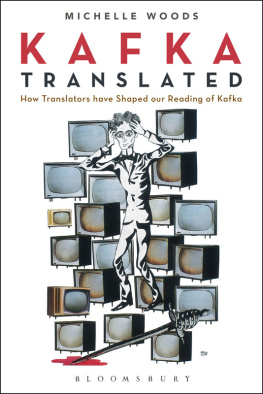
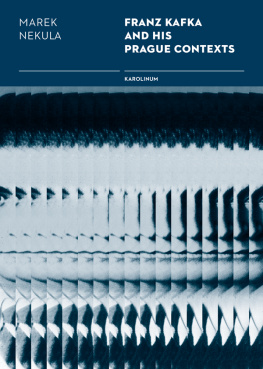
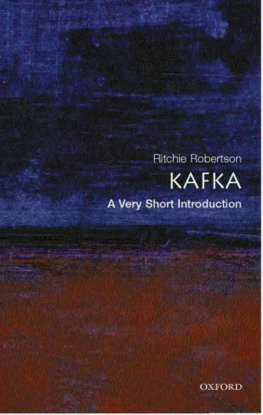

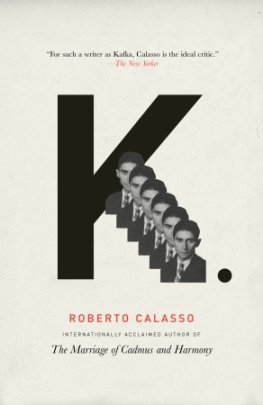

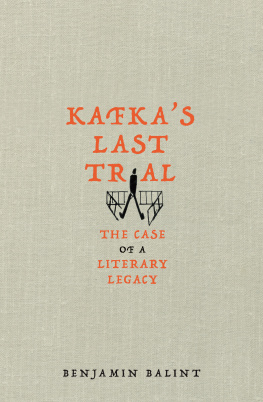
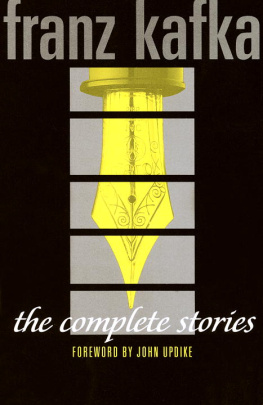
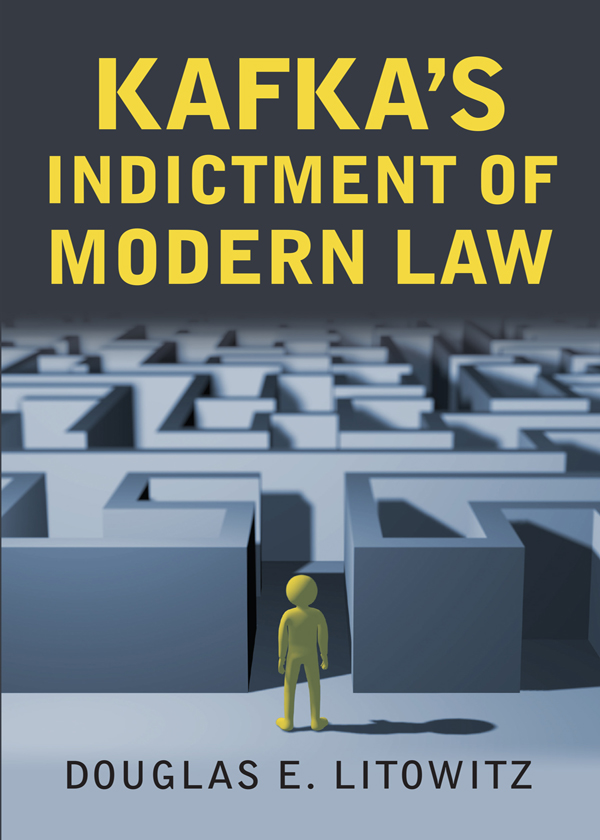
 University Press of Kansas
University Press of Kansas